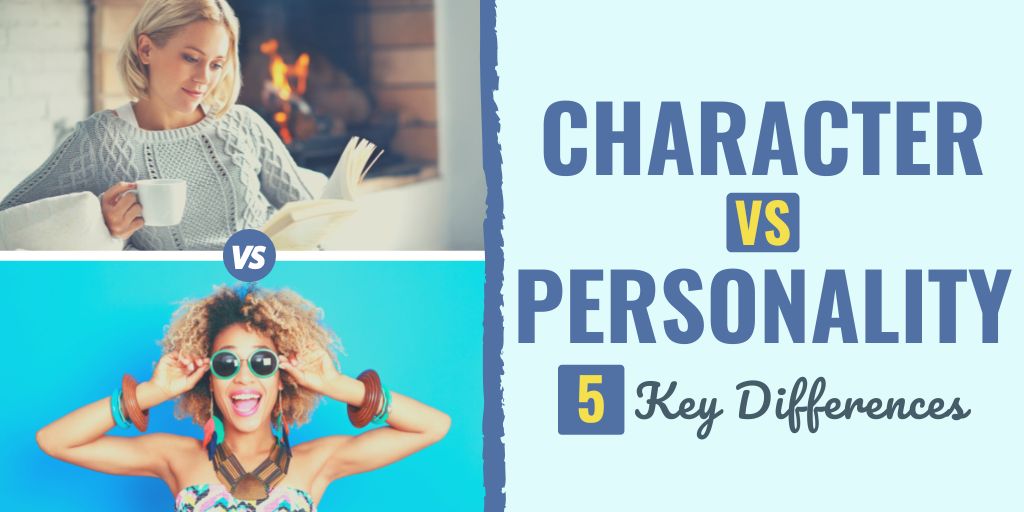There might be affiliate links on this page, which means we get a small commission of anything you buy. As an Amazon Associate we earn from qualifying purchases. Please do your own research before making any online purchase.
What is the difference between character vs personality? I think you will agree that it can sometimes be difficult to discern the difference between the two. The fact is it can be incredibly easy to confuse character with personality. Someone can have a good personality and still have a weak character.
And this works the opposite way, too. Many people who have excellent character lack a strong personality. It often starts with self-awareness. If you can’t see the person in the mirror for who they truly are, you will likely be misguided. This makes it a topic worth exploring, so let’s dive into the key differences between character and personality.
What is Personality?
Personality is defined as the unique combination of mental behavior, along with qualities and traits such as feeling, acting, and thinking patterns. Your personality determines how you behave, think, and feel in specific manners when you're faced with a diverse situation. Additionally, your personality refers to how your dispositions such as thoughts, attitude, emotions, and feelings are systematically arranged.
When you meet someone for the first time, you can get a good feel for their personality very quickly. As an example, if you have ever conducted a job interview with a candidate, perhaps you watched for clues to who the person was as an individual. What we see in this situation is a person's personality.
In the job interview example, you can reflect on what a person's character may be based on their answers to specific questions. However, it's usually impossible to fully determine a person's character in a short period of time unless you meet this person in dire or heated circumstances.
Another example of how to understand the difference between personality and character is as follows. Let's say that you have a naturally funny personality and you're able to use humor in most situations. Some people will use this gift in a self-deprecating and humble way. Another person may use their gift of humor in a sarcastic or biting way. Being naturally funny is a personality trait, and your character can be revealed in how you use that trait.
What is Character?
Character is defined as the distinguishing and enduring moral and mental characteristics that a person possesses as a human being. Your character will determine your response or action to any given situation or event. Generally, your character is what defines your thinking style and behavior pattern. Also, your character controls your feelings. A person's character is based on their surrounding environment, as well as their moral principles and mental abilities.
Can you determine a person's character from a first meeting? Usually not. A person's character traits reveal themselves in specific types of circumstances that are usually uncommon. For example, a soldier in wartime can fairly quickly determine the character of his fellow soldiers. Similarly, if you interact with someone in a crisis situation, you will see their character.
In common situations, it can take months and even years to see someone's character. The best way to determine a person's character is to try to objectively observe how a person behaves as opposed to who they say they are. For example, a person can have the personality trait of being generous. Do they use this trait in a quiet way, or do they make sure everyone knows when they've been generous to someone else?
9 Key Differences Between Character and Personality
Below, we list some of the primary differences between personality and character.
1. The Main Difference: Traits vs. Collections
The primary difference between personality and character is this:
Personality refers to a person's collection of behaviors, abilities, ideologies, beliefs, and attitudes. Character refers to a person's distinct qualities or traits.

Both personality traits and character traits can be either positive or negative. In fact, most people have both negative and positive personality and character traits.
Here are some examples of both positive and negative character traits.
On the other hand, personality traits are more fixed. Here are some examples of personality traits.
It's easy to confuse personality and character with temperament. Most experts believe that a person's temperament is present at birth, but it can be affected by the climate in which people grow up. Temperament refers to a person's tendency to adopt specific behaviors, as well as their disposition. Some temperament traits include:
2. The Inner World vs. the Outward Face
Specifically, personality generally refers to a person's attitude, behavior, and outward qualities. In most cases, a person's personality traits will set them apart from other people.
On the other hand, a person's character is their set of inwardly held mental and moral beliefs and qualities that differentiate them from others.
While both personality and character can have an impact on how a person interacts with society, it can take longer for a person's character to reveal itself.
3. Moral and Mental Characteristics vs. Physical and Personal
Your character consists of the moral and mental characteristics that make up who you are as a person. Alternatively, your personality is based on the individual qualities that show how you think, act externally, or feel when you respond to different circumstances.
As an example, a person's inner compass or character can influence how they conduct themselves outwardly. Perhaps a person's commitment to live a cruelty-free life will compel them to become a vegetarian. Another example is political leanings. Our inward character greatly influences how we react to politics. For most people, voting is the physical manifestation of who we are internally as a person.
4. Difficult to Identify vs. Easy to Identify
You can usually identify a person's personality after interacting with them for just a few minutes (unless they're an excellent actor). However, identifying a person's character right after meeting them is nearly impossible.
5. Enduring Qualities vs. Qualities that Change over Time
While a person's personality can change over time when they grow and make an effort to change, a person's character is more fixed and enduring. In fact, personality is hugely susceptible to change.
It's possible to change one's character, but it's more difficult because our character is rooted in our mental and moral traits and principles. Usually, it takes a drastic event to shift a person's character to the extent that it changes.
6. Validation and Support vs. Non-Validation
Character requires support and validation from the society in which a person lives, and personality doesn't require this validation.
For example, a person's character can be revealed by whether or not they have a criminal record. Also, a person's standing in their work, family, or community groups is also often determined by character. Nevertheless, a person with an excellent character can sometimes have a personality that causes them to be excluded from their social and professional groups.

7. Objective vs. Subjective
Character tends to be objective and isn't influenced by a person's personal opinions or feelings. Instead, a character is based on objective and rational consideration of what we perceive to be facts. These considerations help individuals to make a decision about their moral stance in any given circumstance.
Alternatively, your personality is more subjective because it is based on your tastes, opinions, and feelings.
8. Who We Are vs. How We Appear to Be
Our personalities show the people around us who we appear to be. However, our character is more representative of the person we truly are.
As an example, a person with an abrasive personality can come across as over-confident and brash to the people they interact with from day to day. However, on the inside, this person may actually feel insecure, inferior, and vulnerable. Their personality makes them feel the need to show a different outer face to the world when they are actually something totally different.
Most of us know that one person (or more!) who appears to be a total jerk but is in actuality a complete softy on the inside. In many cases, our true character is hidden and will reveal itself naturally when circumstances call for it.
9. Heredity vs. Malleability
In many cases, our personalities are inherited. However, the character traits are more malleable, and character can be taught.
Character traits are based on distinctive beliefs and core values, and personality traits are not.
Final Thoughts on Character vs Personality
You can work on your personality and your character, but it's much easier to develop a strong character than to change your base personality. Throughout your life, you can continue to grow and learn.
Do you want to develop and build your character? As one of the most misunderstood character traits, integrity is also the easiest one to develop. You can start right now, today, having more integrity. Check out these 56 integrity quotes to help you on your growth journey.


